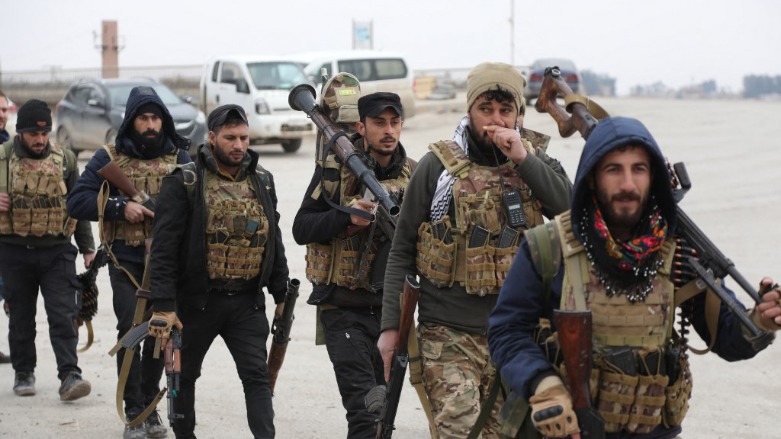ISIS prison raid in Hasakah failed to ‘refill’ group’s rank: US-led coalition

ERBIL (Kurdistan 24) – ISIS’s attack on al-Sina’a prison in the northeastern Syrian city of Hasakah last month failed to “refill” that group’s rank, the US-led coalition declared on Friday.
“Daesh (ISIS) failed to refill its ranks & forces by releasing 4,400 detainees in Hasakah,” tweeted the official account of the coalition. “#ISF (Iraqi Security Forces) has ratcheted up efforts to tackle terrorist threats.”
Daesh failed to refill its ranks & force by releasing 4,400 detainees in Hasakah. #ISF has ratcheted up efforts to tackle terrorist threats. We are committed to #AdviseAssistEnable our ISF/Peshmerga, & SDF partners in the anti-Daesh fight with determination & in full solidarity. https://t.co/1Ys75LJqQh
— Inherent Resolve (@CJTFOIR) February 4, 2022
“We are committed to #AdviseAssistEnable our ISF/Peshmerga, & SDF (Syrian Democratic Forces) partners in the anti-Daesh fight with determination & in full solidarity.”
The coalition was referring to ISIS’s coordinated assault on the al-Sina’a prison, which holds 3,000-3,500 suspected terrorists, that began on Jan. 20 and ended after the Kurdish-led SDF, with support from the coalition, completely recaptured the facility last Sunday.
A senior US official told the New York Times estimated that 200 prisoners had escaped.
Read More: US commends SDF for recapturing Hasakah prison from ISIS
Also, on Friday, the coalition published a short fact sheet about its advise, assist, enable campaign.
The US-led coalition officially ended its combat mission in Iraq in December 2021 and transited to an entirely advisory role.
“While the full plan is classified according to policies enacted by the 77-member Coalition, highlights from the plan are that the Coalition continues its core mandate to maintain the enduring defeat of Daesh; by, with, and through partner forces that is made possible by Coalition advice, assistance, and enablement,” the fact sheet read.
Brig. Gen. Nick Ducich, director of the Military Advisory Group, said that the “most visible forms of the ‘advise’ missions are conducted at the Joint Operations Command – Iraq in Baghdad, and at the Kurdistan Coordination Cell in Erbil.”
“At both locations, advisors from different Coalition countries… diverse backgrounds, different walks of life, work side-by-side with Iraqi Security Forces and the Peshmerga, to help solve challenges in a complex environment,” he said. “We advise the ISF and KSF senior leadership and commanders at the operational level on a daily basis. Territorially, Daesh is defeated and incapable of holding large swathes of land.”
He went on to warn that this doesn’t mean the group still poses a substantive threat.
“They are much smaller and highly mobile, and still seek vulnerable targets,” he said. “That is why the emphasis is on sustaining the focus on defeating Daesh through advising. The importance of this phase is to advance the ISF and KSF’s capabilities and operational reach to maintain the enduring defeat of Daesh.”
The fact sheet explained that the assist part of the mission “means the physical transfer of military resources, such as divestments, to Partner Forces.”
“The types of vehicles transferred consist of armored military security vehicles, ambulances, wreckers, and fuel tankers,” read the coalition paper. “Communications equipment ranges from radios to air traffic control systems, and the firearms and ammunition include a variety of weapons to assist partner forces to maintain Daesh’s enduring defeat.”
The enable part of the coalition’s mission “is effects-based capabilities provided by the Coalition that are not possessed by Partner Forces, to ensure overmatch of the enemy.”
“One common form of enabling that the Coalition provides is through Intelligence, Surveillance and Reconnaissance platforms, a capability that Iraqi, Peshmerga, and SDF partners rely on to assist in real-time decision making by operational commanders,” read the fact sheet.
It quoted Maj. Gen. John W. Brennan Jr., a Combined Joint Task Force – Operation Inherent Resolve (CJTF-OIR) commander, who pointed out that the enabling part of the mission “goes well beyond kinetic means.”
“Enabling means providing partners with fires intelligence, surveillance, and the fusion of these capabilities,” he said. “While we no longer operate at the tactical level, and we no longer operate from our own bases in Iraq, our Coalition brings a tremendous amount of capabilities that can enable our Partner Forces to overmatch Daesh and ensure it never again regenerates to threaten the region.”
He recalled that the coalition “answered the call for help back in 2014, when Daesh ravaged the region.”
“At the invitation of Iraq, the Coalition degraded, dismantled, and ultimately destroyed Daesh’s territorial ‘caliphate’ in 2017,” he said. “While it is militarily defeated, Daesh remains an existential threat to the region.”
He added that this “threat is manifested in the makeshift prisons and IDP (internally displaced person) camps in Eastern Syria, where Daesh is clearly attempting to refill its ranks.”
“At the invitation of the Republic of Iraq, we will continue to advise, assist, and enable our partner forces to ensure Daesh is unable to regenerate within Iraq or Syria,” he concluded.